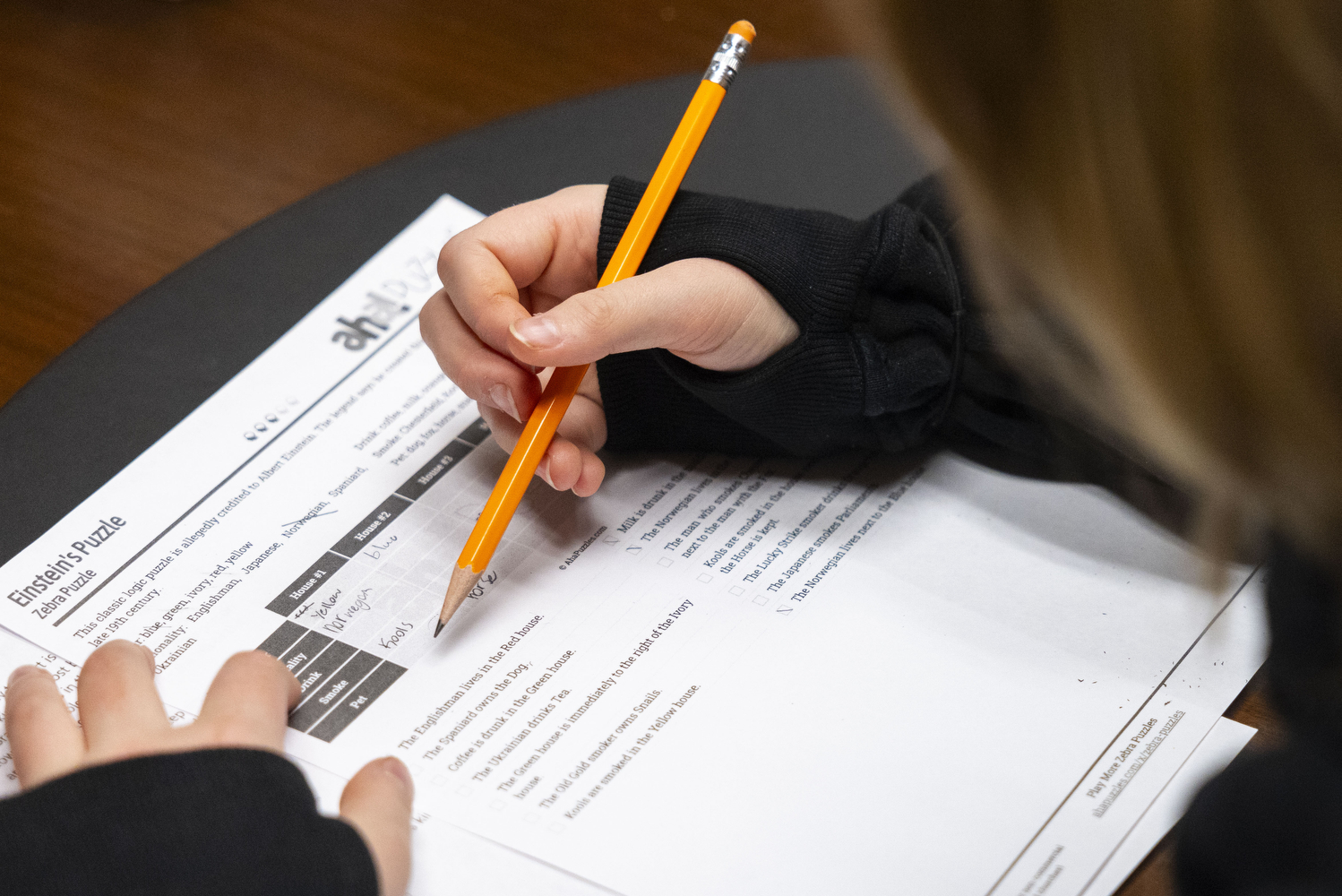Iowa City West High School senior Andreas Warren thought he would regret not taking the ACT exam after it became test-optional for most colleges and universities across the United States.
“I thought it was going to be like a super risky move,” Warren said. “But at this point, I don’t think so.”
Warren, who wants to study musical theater in college, said he has already been accepted by two out-of-state universities and received some merit-based scholarships.
The ACT test, the well-known college admissions test that was introduced by University of Iowa education professor Everett Lindquist in 1959 and became the reason for the ACT Inc. headquarters in Iowa City, is experiencing its most tumultuous time in six decades as admissions tests become optional and average scores decline.
Average ACT scores in Iowa dropped to their lowest level in the last decade at 20.8 — almost 16 points off of the highest possible exam score of 36, according to ACT data from October. These scores come after over 1,900 U.S. colleges and universities chose to not require SAT or ACT scores for admissions in fall 2024, according to FairTest.
Fewer students are also taking the exam, according to ACT data that has slightly decreased over the last three years. Forty-eight percent of estimated high school graduates in Iowa took the exam this year as opposed to 49 percent the year prior.
However, not everybody thinks it’s a good idea to neglect these college exams.
The national composite ACT scores dipped 0.3 this year to 19.5 — the sixth consecutive year of score declines.
Of those who took the test, “more than four in 10 seniors meet none of the ACT’s college readiness benchmarks,” ACT revealed in its October report.
Defenders argue for the continuing value of college admissions tests
Higher education experts — and area ACT and SAT prep tutors — say some K-12 students are still taking the ACT and SAT in high school to receive merit-based scholarships, but others, who are not necessarily seeking scholarships, are betting that the colleges they will apply to are test-optional.
Many factors contribute to the lower average scores, including lack of retention taught in schools, according to ACT prep professionals.
Amy Seeley, a founding member of the National Test Prep Association and Seeley Test Pros, an academic tutoring service in Ohio, said the most obvious cause of low ACT scores is that COVID-19 disrupted student learning.
“You’re going to start to see this trickle down if they don’t remember it,” she said. “You’re also just seeing that for some, the focus on memorizing information isn’t really there.”

Seeley said a large problem she and other test preppers see in students is their inability to memorize formulas in math, which is needed for the ACT.
The ACT has four individual tests in English, math, reading, and science reasoning. This year, only 37 percent of the 2023 graduating class in Iowa met the ACT math benchmark of a score of 23.
“I’ve never seen kids who can’t multiply, add, subtract, or divide,” she said. “And now, to be fair, the ACT does allow students to use a calculator, which can be an edge.”
Rose Babington, ACT’s senior director for state and federal programs, said ACT recommends school districts break down the data from its students that ACT provides to see what trends and causes of low scores can be discussed.
Babington said in Iowa’s high school class of 2023, 62 percent of students indicated that they had taken their full core curriculum across English, math, reading, and science. Compared to the year prior, 70 percent students self-reported students taking their core classes.
“I think I go back to the local perspective on it,” Babington said. “I think a big focus in a lot of states is looking closely at that data and what those trends are trying to say, what do we need to do right now?”
She added that ACT has partnerships with almost half the states in the country, not including Iowa, to offer the ACT in schools for free. Most ACT tests are taken on computers instead of paper, she said.
“[It’s] quite a bit above the national average — 19.5 is the national average — and I will say Iowa consistently tends to be a state that scores above the national average, but seeing a drop of this size, a 0.6 drop, when you have about the same number of students definitely is something that’s significant,” Babington said.
With most schools starting to allow test-optional admissions, the process of applying to undergraduate programs and what materials they require isn’t consistent across all universities.
Jason Derby of Derby ACT Prep in Dubuque, Iowa, said some schools announced they are test optional for admissions, but not for select scholarships.
“Sometimes it means test-optional, but you have to come to these three interviews if you’re not going to submit your test,” he said. “Sometimes it means tests optional for these two out of our 17 programs, but not the other 15.”

Although some colleges don’t require admissions tests, they still may use them to determine scholarships and other factors for the final tuition bill.
“The colleges need data points in order to determine what your tuition will be,” Kelly Finn, founder of FinnPrep in Cedar Rapids, said. “I have conversations about this nationally, and they need to see data. They need to see your GPA and test scores, your courses, so forth.”
Warren said while applying to colleges, he noticed that some applications required writing an additional essay instead of submitting an ACT score.
“It’s more work, but I think it is worth it to show a part of yourself,” he said.
Seeley said she advises her student clients to take the ACT or SAT if they are pursuing a full ride at a state university.
“I will say in the test prep industry, for many years, for most students, at least in my area in the Midwest, getting a better test score isn’t about going to a more selective institution — it’s about accumulating those scholarship dollars so that college is more affordable.”
College undergraduate students on average receive an average merit award of nearly $12,000 during the 2022-23 academic year, according to U.S. News and World Report.
ACT downsizes headquarters
In an effort to address “large-scale, rapid” changes in the admissions business, ACT Inc., based in Iowa City at 500 Act Drive, laid off 13 percent — around 100 employees — of its Iowa City workforce in May. ACT employs about 1,100 people across the U.S.
ACT is reportedly ranked No. 37 on Zippia’s list of the 100 largest companies in Iowa.
The nonprofit lost over $100 million in its fiscal year that ended on Aug. 31, 2020, in educational assessment and workforce development revenue that is generated by the ACT exam.
In June, ACT sold the Tyler Building at 301 Act Drive to the Iowa City Community School District for $8.75 million.
ACT CEO Janet Godwin attributed the sale in a statement in May to the rise in hybrid work schedules at ACT after the pandemic.
“We determined that we could consolidate and make better use of the space on our campus,” she said in a release in June.
According to the Johnson County Assessor’s website, ACT owns five properties on its campus that are collectively assessed at a net value of $25,423,140 this year.
Concerns rise on ACT test equity
Since the ACT test was introduced in 1959 to measure how prepared high schoolers are for college, the testing process has been criticized by many for not being equitable for students of color and those in lower socioeconomic classes.
A study by Student Aid Policy revealed that white high schoolers are two times more likely as Hispanic or Latino students and three times more likely than Black students to have combined ACT score of 31, or SAT test scores of 1400 to 1600.
ACT does offer a fee waiver to take the test for free up to four times for students who are eligible for free and reduced lunches in schools.
Some students and high schools in the U.S. have taken to the legal system to push for test-optional admissions because they claim the ACT and SAT are biased.
A school district and students won a lawsuit in 2019 that charged the University of California to make the SAT and ACT optional for college admission. The university complied and eliminated the requirement in 2020.
Following the suit, many other schools, including the University of Iowa and state Board of Regents universities in January 2022, have since removed standardized testing requirements.
Changing the higher education admissions process has been a hot topic this year after the U.S. Supreme Court voted in June to remove race-based admissions.
Some test preppers, like Derby, said equity issues in higher education will still exist if the ACT is removed from the admissions process.
“There’s a difference between the ACT causing inequity and the ACT just being the mirror that shows it and brings it to light,” he said. “I think that it’s just really important that we keep bringing that to light. There’s no denying that it’s there.”



